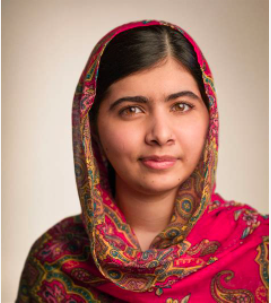Influential Women from Pakistan
- Anita Goncharuk
- Apr 5, 2022
- 2 min read
Written by: Anita Goncharuk
Malala Yousafzai
Malala Yousafzai is a fierce and passionate activist for women’s rights, as well as the youngest person to ever receive a Nobel Peace Prize (at age 17). Born in 1997, Malala quickly took to fame in 2009 when her diary of the dreadful life of a girl under the egregious Taliban rule was published. Her fame was propelled internationally in 2012 when she was shot in the head by a Taliban gunman for her outspokenness. Making a full recovery a year later, Malala had become the symbol for women’s rights to education. Her campaign for women’s rights continues around the globe; a fund has been set up in her name to aid women and girls in receiving the basic right of education. What began as a simple diary relaying the discrimination and hardship she went through as a schoolgirl soon became a worldwide movement to support women’s rights.
Muniba Mazari

Muniba Mazari was born in 1987. She was brought to fame after an incident she sustained at age 21, leaving half of her body paralyzed and bringing her lifetime confinement to a wheelchair. After such a life-altering event, though, she persevered and found a novice passion for art. Some years later she became a motivational speaker, making her mark at a TEDx event in 2014 in Islamabad. Muniba Mazari still inspires people with her zealous and eloquent speeches. Alongside being a motivational speaker, Mazari is a passionate advocate for ending gender-based discrimination and aiding in the design of a gender-equal world. In December of 2015, she was ordained by UN Women Pakistan with the position of being the first National Ambassador to promote women’s empowerment. In this position, Mazari promotes campaigns that aid in ending gender discrimination. The life-changing accident she endured at 21 only made Muniba Mazari stronger, allowing her to reach out and touch the lives of countless people.
Parveen Rahman

Parveen Rahman was a Pakistani social activist who implemented the Orangi Pilot Project (OPP). This sanitation program works to provide slums with proper sewage lines and latrines so as to prevent the spread of diseases. Sanitation for over one million people has been improved since the inception of the OPP in the 1980s. For twenty-eight years of her life, Parveen Rahman held a career advocating for Pakistan’s poor by developing impoverished neighborhoods. She empowered people and drastically improved the lives of many. Regrettably, on March 13, 2013, Rahman’s vehicle was gunned down by four men. The death of Parveen Rahman struck a fierce blow to many who were touched by her work. Numerous times throughout history, women have been endangered with physical assault for being too outspoken about controversial topics; this violence proved to be fatal for Parveen Rahman. However, the benevolent work she accomplished progressed; the Orangi Pilot Project continues to advance. The one million-plus people who were aided by this project will not be quick to forget Parveen Rahman.










Comments